Downloads & Publications
Learning
from practice
By documenting its projects, the Finck Foundation aims to share the knowledge gained during research, development and implementation with as many interested parties as possible.
A selection of completed projects, as well as bachelor and master theses can be found below.
Own projects
Agroforestry new plantation

Initial establishment of an agroforestry system with animal integration
Research work on our projects
Benefits and obstacles of regenerative agriculture
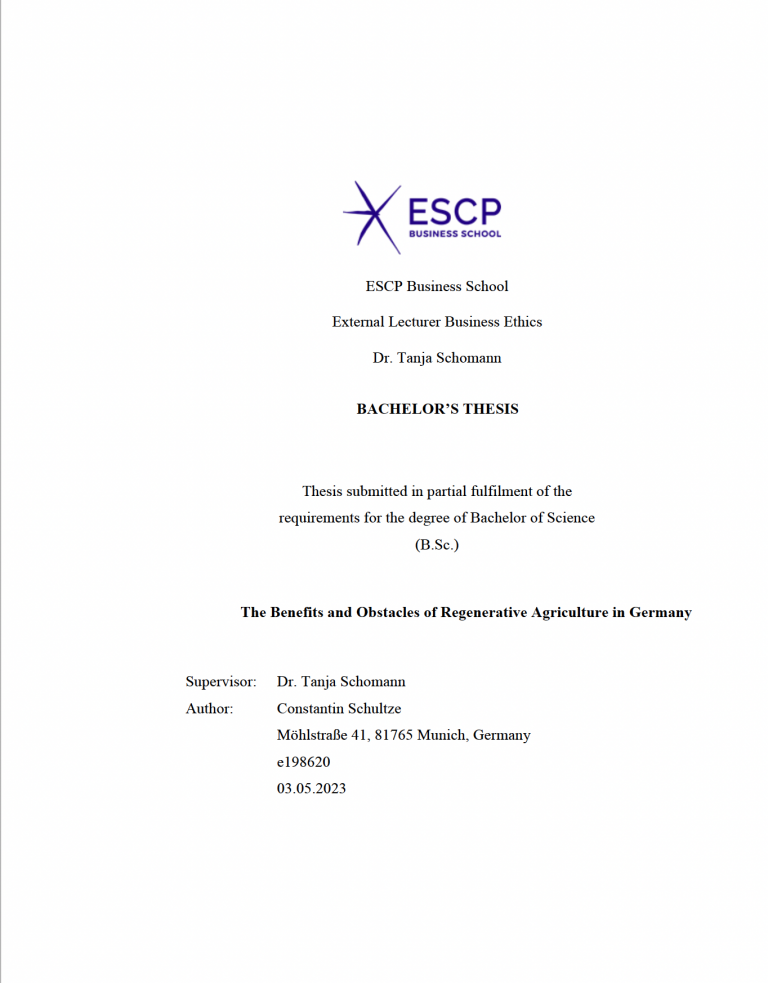
The Benefits and Obstacles of Regenerative Agriculture in Germany.
B. Sc. Constantin Schultze, ESCP Business School, May 2023
Case study agroforestry and ecosystem revitalisation
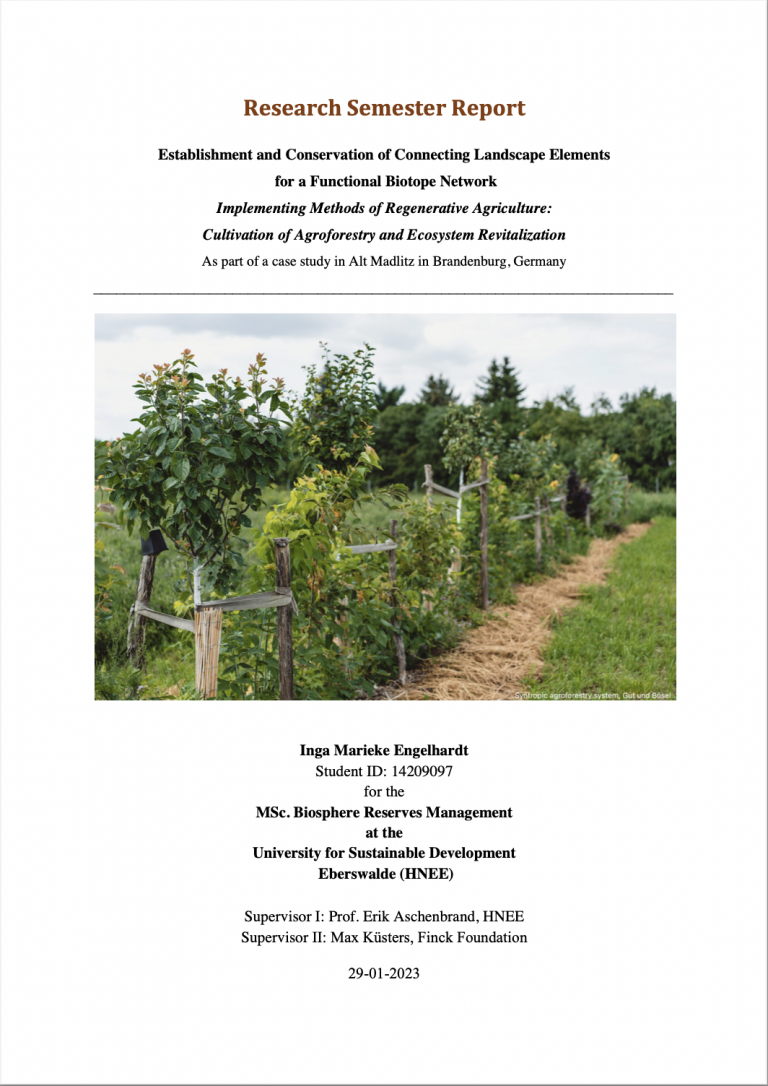
Establishment and Conservation of Connecting Landscape Elements
for a Functional Biotope Network.
Implementing Methods of Regenerative Agriculture.
M. Sc. Inga Marieke Engelhardt, University of Applied Sciences for Sustainable Development Eberswalde, January 2023
Value creation through agroforestry

Pathways to value creation with modern agroforestry systems. A qualitative analysis of commercial practices in Germany.
M. Sc. Zoé Jana Schierholz, University of Applied Sciences for Sustainable Development Eberswalde, December 2022
Carbon storage in
agroforestry systems
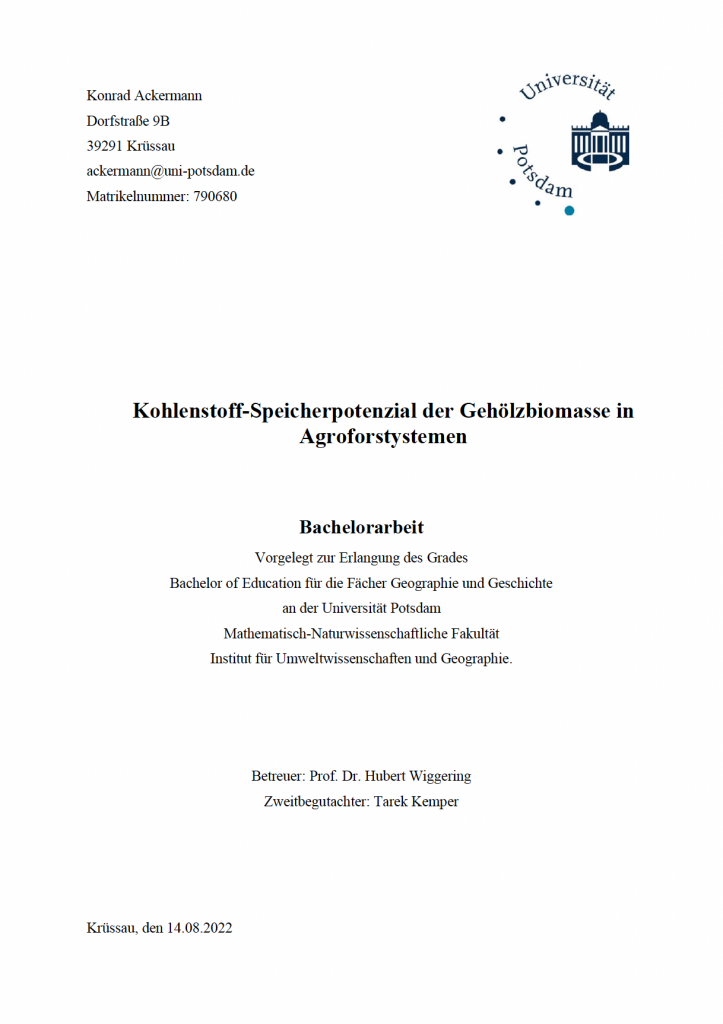
Carbon storage potential of woody biomass in agroforestry systems.
B. Ed. Konrad Ackermann, University of Potsdam, Faculty of Mathematics and Natural Sciences, Institute of Environmental Sciences and Geography, August 2022.
Mobile stall management
in agroforestry systems
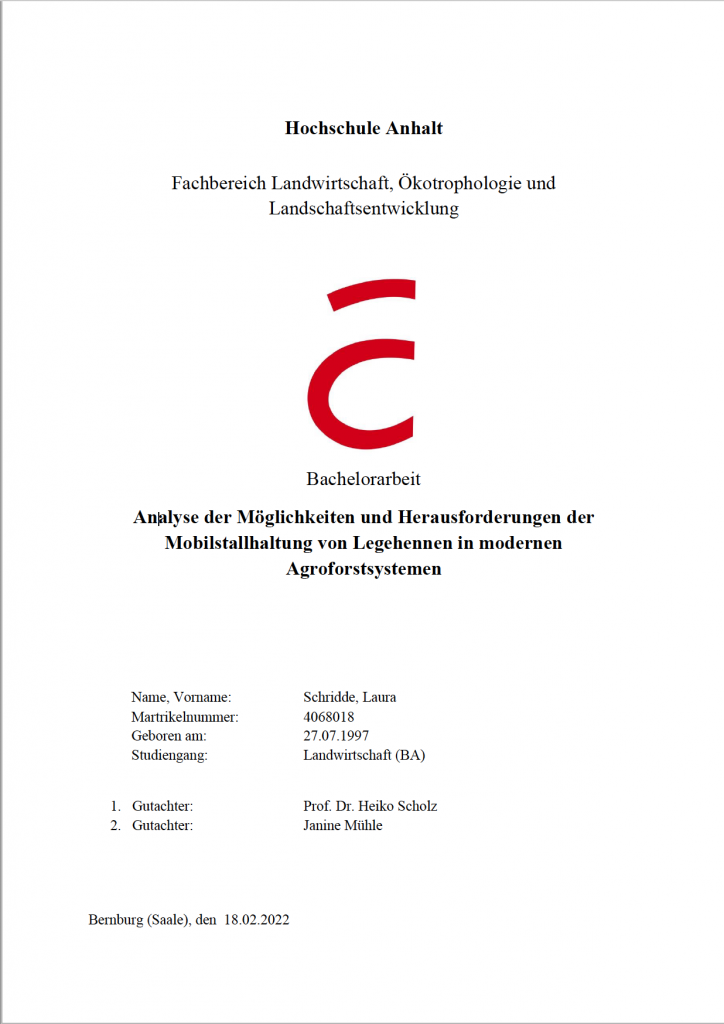
Analysis of the possibilities and challenges of mobile housing of laying hens in modern agroforestry systems.
BA Laura Schridde, Anhalt University of Applied Sciences, February 2022
Agroforestry as adaptation strategy to climate change
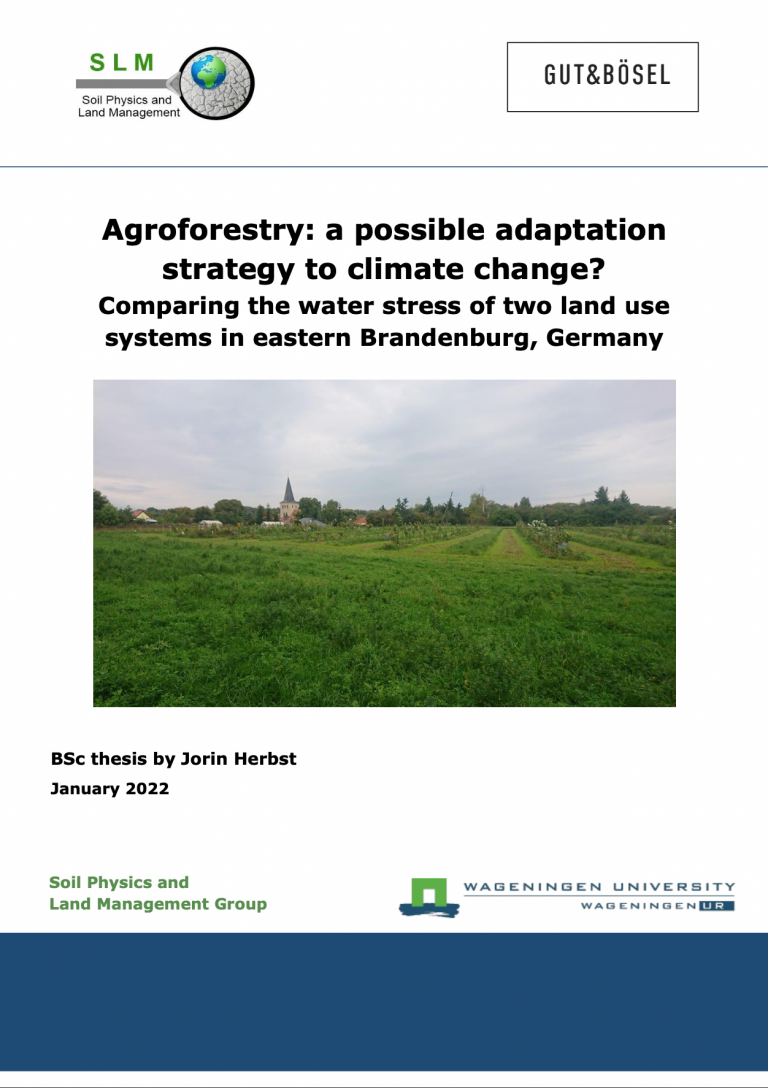
Agroforestry: a possible adaptation strategy to climate change? Comparing the water stress of two land use systems in eastern Brandenburg, Germany.
B. Sc. Jorin Herbst, Wageningen University, January 2022
Agroforestry systems
in Germany
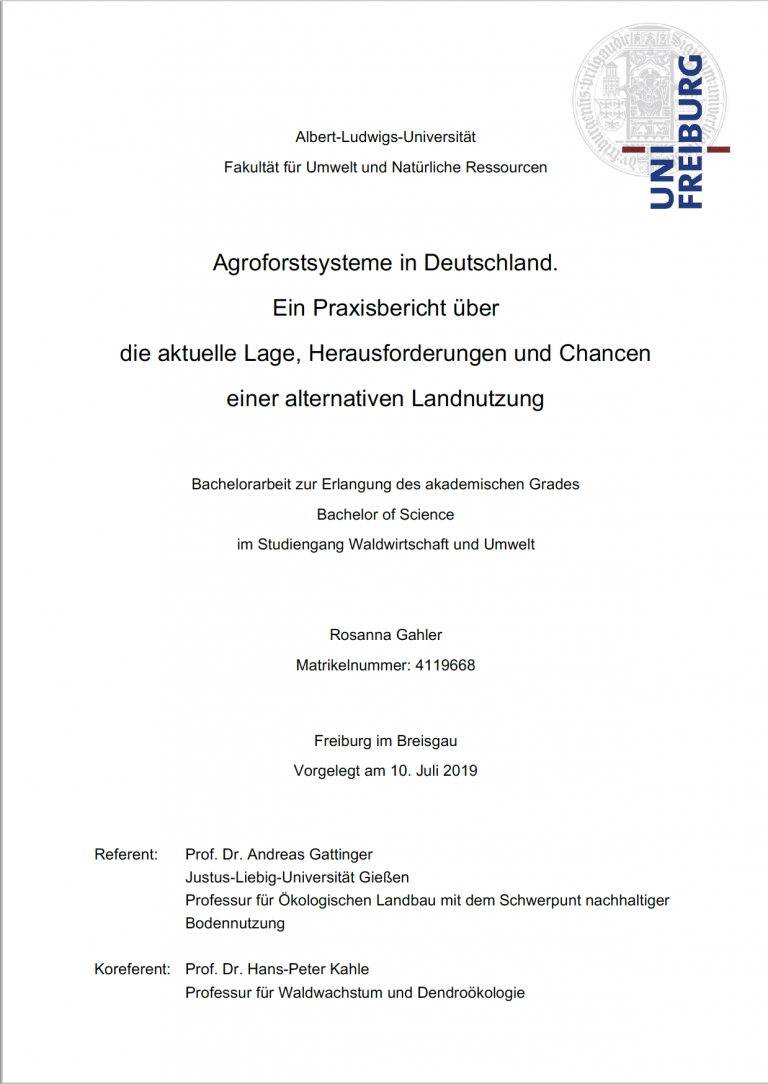
A field report on the current situation, challenges and opportunities of an alternative land use.
B. Sc. Rosanna Gahler, Albert-Ludwigs-University Freiburg, Juli 2019
Guiding principles and social contract of the Finck Foundation
As an independent research institute, we, the Finck Foundation, are aware of our responsibility that comes with the constitutionally granted freedom of research. Based on the Guidelines for Safeguarding Good Scientific Practice of the German Research Foundation (Deutsche Forschungsgemeinschaft e.V.), we have formulated our binding research ethics, which can be viewed here. Our articles of association can be found here.
In its role as a multiplier, the Finck Foundation would like to draw attention to the latest findings in the field of research and share them with as many interested parties as possible.
A selection of recent articles and papers can be found here.
Agroforestry in general
“Multifunctionality of temperate alley-cropping agroforestry outperforms open cropland and grassland” – A very large study by JKI on the increased multifunctionality of cropland and grassland agroforestry versus pure crops with a large field-based data synthesis, a real milestone in agroforestry research. Published in: Communications Earth & Environment Volume 4, Article number: 20, January 2023.
“Reducing Wind Erosion through Agroforestry: A Case Study Using Large Eddy Simulations” – A case study with modeling from the University of Göttingen. Published in Sustainability, Special Issue Agroforestry for Sustainable Soil Management, October 2022.
“Modification of the microclimate and water balance through the integration of trees into temperate cropping systems” – Review article from University of Giessen. Published in Agricultural and Forest Meteorology, Volume 323, August 2022.
Carbon Storage
“Soil organic carbon sequestration in temperate agroforestry systems – A metaanalysis” – TU Munich metaanalysis. Published in Agriculture, Ecosystems & Environment Volume 323, January 2022.
Insects
“Distribution of overwintering invertebrates in temperate agroforestry systems: implications for biodiversity conservation and biological control of crop pests” – Field-based paper from the University of Montpellier. Published in Agriculture, Ecosystems & Environment Volume 285, December 2019.
Pasture Management
Mob Grazing – an alternative grazing strategy?
Basics and overview of the benefits of holistic grazing management, Author: Anne Verhoeven, LWK Nordrhein-Westfalen, VBZL Haus Riswick, Kleve.
Further links on mob grazing and sustainable pasture management
Publications, initiatives, videos and more, compiled by the Mob Grazing network to promote mob grazing as a sustainable grazing practice including practice-based accompanying research.
Plant health
“Crop Diseases and Mycotoxin Accumulation in Temperate Agroforestry Systems” – Field-based measurements by JKI, the only study on this worldwide. Published in Sustainability, 11, May 2019.
Regenerative Agriculture
“The Case for Regenerative Agriculture in Germany – and Beyond” – Boston Consulting Group study, authors: Torsten Kurth, Benjamin Subei, Paul Plötner, and Simon Krämer. January 2023.
Soil Emissions
“Impacts of monoculture cropland to alley cropping agroforestry conversion on soil N2O emissions” – Field-based measurements of N2O by the University of Göttingen. Published in GCB Bioenergy, Volume 15, Issue 1, January 2023.
“Reduced Soil Gross N2O Emission Driven by Substrates Rather Than Denitrification Gene Abundance in Cropland Agroforestry and Monoculture” – Research article on field-based measurements of nitrogen (N2O) by JKI. Published in Journal of Geophysical Research (JGR) Biogeosciences, February 2022.
Soil Microorganisms
“Tree-distance and tree-species effects on soil biota in a temperate agroforestry system” – JKI field-based measurements at Forst an der Lausitz on earthworm abundance and potential plant disease suppression. Published in Plant and Soil, February 2023.
“Abundance, Diversity, and Function of Soil Microorganisms in Temperate Alley-Cropping Agroforestry Systems: A Review” – JKI review article. Published in Microorganisms, March 2022.
“Tree rows in temperate agroforestry croplands alter the composition of soil bacterial communities” – Field-based measurements by JKI. Published in PLoS ONE 16(2), February 2021.
Weeds

